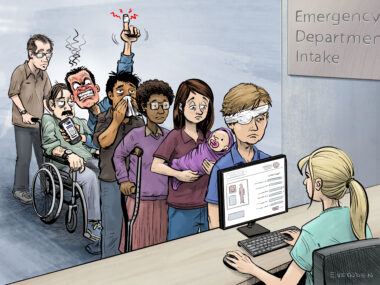Written by Jacquie Moore, BA’97
Despite their devastating impact, the cloud of pandemic lockdowns has had unexpected personal silver linings for many of us: fresh routines, renewed hobbies, less social pressure, etc. Certainly, some of these lifestyle changes could stick (hello, working from home twice a week), and some won’t (you still birdwatching?).
On a larger scale, the pandemic-induced impact of the new, open conversation around mental health seems to have staying power — finally, with more than one in five Canadians reporting increased levels of mental distress over the course of the past three years, we’re loosening our grip on the stigma attached to talking about our psychological, emotional and social well-being.
While that’s a huge win for the health of our society, access to crucial mental health support services haven’t caught up.
“COVID-19 affected many areas of people’s lives, from sleep to relationship dynamics,” says Dr. Brae Anne McArthur, PhD, a registered psychologist and director of the University of Calgary’s Psychology Clinic. “Things got so severe for so many people that the importance of mental health could no longer be ignored.” The issue, she says, is that “waitlists are long and it’s virtually impossible to access mental health services right now, in both public and private domains.”
McArthur and her team are finding creative ways to get help to individuals who need urgent support.
“We help people manage in a crisis by teaching skills that can also be applied to future life events.”
Dr. Brae Anne McArthur, PhD, UCalgary’s Psychology Clinic
The Psychology Clinic, opened in 2017, is a high-tech training hub for graduate students that offers affordable outpatient psychological services to the community — in other words, high-calibre “talk therapy.” Supervised graduate students work one-to-one with community members to address mental health conditions like anxiety, depression and other forms of psychological distress. It’s evidence-based support that, says McArthur, “targets many aspects of one’s life versus a medical approach that sometimes looks to treat a single ailment — we can provide treatment that looks at your life holistically.” Clinical psychology, she says, “allows for a clinician to work with an individual to determine their unique needs — we help people manage in a crisis by teaching skills that can also be applied to future life events.”
Just as in precision medicine, the trend in counselling psychology is toward “precision” care. “The one-size-fits-all model is being challenged,” says McArthur. “We tailor support to ensure maximum effectiveness and greatest impact for each person.”
As demand for services grow, McArthur and her team are working to increase the number of spaces for students and supervisors to offer more assessment and therapy appointments. Currently, the clinic supports 21 master’s and doctoral students, with five clinical supervisors overseeing nearly 370 therapy sessions for people from the community in 2021 alone.
To ensure their continued efforts and appointments go to Calgarians in need and often disadvantaged by systemic barriers, the clinic recently partnered with Skipping Stone, a local non-profit that supports trans folks. “Often, those who need the most support are unaware of what’s out there for them,” says McArthur.
It’s a rich, complex conversation but, at long last, we’re having it.




